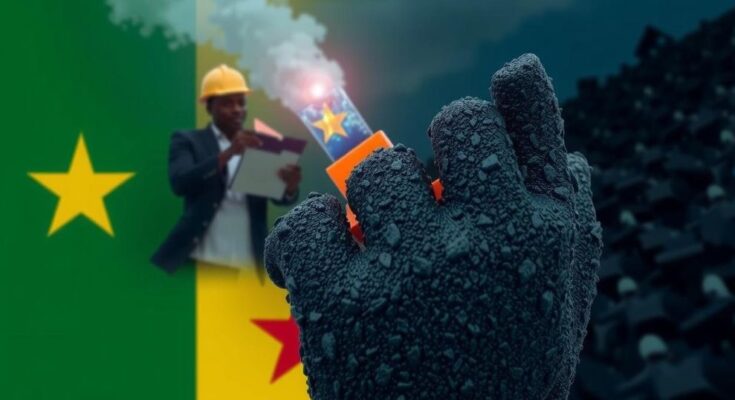As Ghana prepares for its presidential election, the crisis of illegal mining known as “galamsey” sharply impacts both the electoral landscape and the environment. With rising unemployment forcing individuals to engage in harmful mining practices, the election serves as a platform for voters to demand sustainable governance and solutions to combat the environmental and social ramifications of illegal mining activities.
In Ghana, illegal mining, often referred to as “galamsey,” has surged, presenting significant socio-economic and environmental challenges. This phenomenon becomes particularly pertinent as the nation prepares for its presidential election, where discussions surrounding galamsey’s impacts loom large. As voters prepare to elect a successor to current President Nana Akufo-Addo, candidates are compelled to address the adverse effects of illegal mining, which has devastated agricultural lands and polluted essential water bodies. With high unemployment and poverty driving individuals like Frank, an anonymous illegal miner, to risk their lives for a weekly income that rivals that of formal educators, the call for institutional support and sustainable practices grows louder.
Ghana, recognized as the sixth-largest gold exporter and second-largest cocoa producer globally, is grappling with the ramifications of illegal mining. Significant tracts of cocoa farmland in key regions such as Western and Ashanti have been lost, compromising a substantial component of the country’s export economy. Reports detail over 19,000 hectares of fertile land rendered barren, while rivers contaminated with toxic runoff threaten access to safe drinking water for millions. In response to escalating protests, President Akufo-Addo’s administration is under scrutiny for its previous promises to eradicate galamsey, which, instead of improving, has intensified amid increasing gold prices and youth unemployment.
Despite governmental operations against illegal mining, enforcement remains inconsistent and poorly coordinated, leading to further public dissatisfaction. Meanwhile, stakeholders, including environmental advocates and miners, express a need for more comprehensive engagement in addressing the crisis. The sentiment is echoed in statements by Clement Abaidoo, who highlights the absence of a clear strategy among political parties to combat the illegal mining dilemma. As the election approaches, the issues surrounding galamsey exemplify broader government failures, signifying a crucial moment for Ghana to redefine its priorities towards environmental stewardship and economic resilience.
Looking towards the future, the pressing need for responsible mining practices and government accountability resonates throughout the electorate. Citizens like Frank wish for viable alternatives to illegal mining, emphasizing a desire for jobs that sustain their families without compromising the environment. The election represents an opportunity for voters to demand responsible governance that balances economic needs with ecological health.
Thus, Ghana stands at a critical crossroads where its response to illegal mining will shape not only the immediate electoral outcomes but also the long-term health of its natural resources and economic landscape. The choices made in this election have the potential to reflect a communal commitment to sustainable development, one that leverages Ghana’s natural wealth while protecting it for future generations.
Ghana’s illegal mining phenomenon, known locally as “galamsey,” has become a focal point of national dialogue due to its dire ecological, economic, and social effects. The context of an impending presidential election further amplifies the urgency of addressing these issues as candidates attempt to connect with the electorate’s growing concerns over environmental degradation, unemployment, and the risks associated with unregulated extraction activities. As a country rich in natural resources, Ghana faces a critical challenge in reconciling the immediate economic benefits of gold mining with the long-term sustainability of its environment and agricultural productivity.
In conclusion, Ghana’s illegal mining crisis poses significant challenges that intertwine environmental degradation with socio-economic desperation. As the nation nears its presidential election, the candidates’ responses to galamsey will be emblematic of their understanding of sustainable governance. There is an urgent need for strategic engagement between the government, miners, and environmental advocates to formulate effective solutions that address both immediate livelihoods and the imperative of preserving Ghana’s natural heritage.
Original Source: www.cbs19news.com




